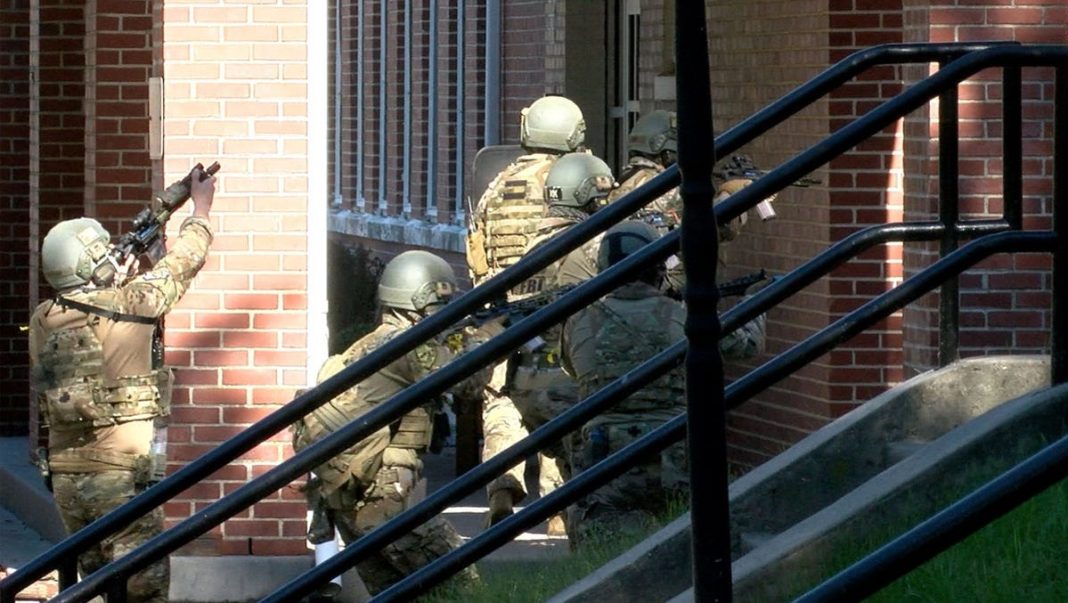FBI SWAT Team Raids Wrong House: Will the Family Be Able to Sue for Emotional Distress? Supreme Court to Decide
The lead agent attributes the error to a faulty GPS directing the team to the wrong location.
WASHINGTON − In the early hours of an October morning in 2017, an FBI SWAT team forced open the door of an Atlanta family’s home, set off a flashbang grenade, and aimed their weapons at the adults, only to discover they had mistakenly raided the wrong house.
The lead agent claimed that a malfunctioning GPS sent them to a residence 436 feet away from where a violent gang member they intended to apprehend was located.
The family took legal action seeking damages for the distress they endured, but an appeals court ruled that they could not sue the government.
On Monday, the Supreme Court agreed to hear the case concerning this ruling.
Lawyers representing the family are arguing that the essential question is whether Congress established a mechanism for individuals to seek compensation for incidents involving mistakes or negligence by federal enforcement officials.
They contend that lawmakers intended to address such issues in 1974 after two similar wrong-house raids. Congress revised the Federal Tort Claims Act to clarify that claims could be made against the government for instances such as false arrest and misuse of legal process.
“Regardless of other considerations, it’s clear that wrong-house raids are central to this provision,” a bipartisan group of lawmakers stated in a document supporting the family’s case.
However, the 11th U.S. Circuit Court of Appeals in Atlanta determined that the Federal Tort Claims Act doesn’t apply when a law enforcement officer’s actions involve some level of judgment, even in cases where that judgment was misused.
The court also cited the supremacy clause, which deems federal law “the supreme Law of the Land,” as a reason to deny the family’s suit, stating that the mistakes made were reasonable given the “rapidly-changing and dangerous context of executing a high-risk warrant during the night.”
Prior to the raid, the lead agent had surveyed the area and noted features he believed were unique to the house. However, both residences were similar split-level homes located on a corner lot, each with a stoop leading up to the front door, windows on either side, and a large tree in the yard along with a side-entry garage on a different street.
Upon entering the incorrect home, residents Curtrina Martin and Hilliard Toi Cliatt feared they were being robbed and took refuge in a bedroom closet, where Cliatt kept a shotgun for protection. The SWAT team forcibly pulled Cliatt from the closet and handcuffed him.
Martin expressed her desperation to the officers, asking if she could check on her seven-year-old son who was frightened and hiding under his bed in another room.
After realizing their error, the team released Cliatt and departed. Following the arrest of their intended target, the lead agent returned to apologize to Martin and Cliatt, recorded the damage done to their property, and provided them with his supervisor’s contact details.
Despite this, the family claims the FBI has not covered the expenses related to the trauma caused, which includes lost income and “years of therapy needed to cope with the raid.”
“The FBI cannot rectify the harm caused by invading the wrong home, but the government should be held accountable for its mistake,” stated Dylan Moore, an attorney from the Institute for Justice, representing the family. “Congress created the FTCA to provide a remedy for individuals like Trina, Gabe, and Toi. Courts should not twist the law to deny that remedy.”
The case, Martin v. U.S., is slated for oral arguments this spring, with a verdict anticipated by summer.

